
Related
Guests
- Fred WeirMoscow correspondent for The Canadian Press, which is the national newswire for Canada, the equivalent of the Canadian Associated Press. He’s also a contributing writer for In These Times magazine.
Russian lawmakers were urged today not to impeach Boris Yeltsin after the Kremlin warned that any move to remove the president would be a declaration of war and plunge Russia into crisis. Kremlin officials made the stark warnings overnight, before the lower chamber of parliament, the Duma, began a second day of hearings on five charges. Opposition leaders predict at least one of the charges will be passed. Impeaching Yeltsin “will seriously aggravate the political situation and be a declaration of war,” according to a senior Kremlin official quoted by the ITAR-TASS news agency. We speak to Fred Weir, Moscow correspondent for The Canadian Press, which is the national newswire for Canada, the equivalent of the Canadian Associated Press. He’s also a contributing writer for In These Times magazine.
Transcript
AMY GOODMAN: You are listening to Pacifica Radio’s Democracy Now! I’m Amy Goodman.
Russian lawmakers were urged today not to impeach Boris Yeltsin after the Kremlin warned that any move to remove the president would be a declaration of war and plunge Russia into crisis. Kremlin officials made the stark warnings overnight, before the lower chamber of parliament, the Duma, began a second day of hearings on five charges. Opposition leaders predict at least one of the charges will be passed. Impeaching Yeltsin, quote, “will seriously aggravate the political situation and be a declaration of war,” this according to a senior Kremlin official quoted as saying this by the ITAR-TASS news agency.
We turn now to Fred Weir. He is the Moscow correspondent for Canadian Press, which is the national newswire for Canada, the equivalent of the Canadian Associated Press. He’s also a contributing writer for In These Times magazine.
Fred Weir, thanks for joining us from Moscow. Let’s start off by you telling us what exactly is happening.
FRED WEIR: Yesterday, today and tomorrow, the Duma will be debating five articles of impeachment against Yeltsin. Tomorrow, Saturday, they’ll vote on each of the five separately. And if even one of them gets a two-thirds majority in the Duma, the impeachment process will be launched.
AMY GOODMAN: And can you explain what the charges are?
FRED WEIR: Yeah. There are five charges, and they cover quite a gamut of disappointments and disasters of the last decade. The first one is Yeltsin’s guilt for conspiring to dissolve the Soviet Union illegally in 1991. The second charge concerns his great power play in 1993 when he dissolved the opposition-dominated parliament and then brought troops and tanks into Moscow to forcibly disband it when it resisted him, and he then wrote a new constitution. Ironically, that’s the one he’s now being impeached under. The next charge is his launching of the war in Chechnya in 1994. He never consulted with parliament or any other body of power. The war was carried out under his signature alone, lasted two years, and an estimated 80,000 people died. The fourth charge is that Yeltsin underfunded and neglected the Russian army and armed forces, thereby fatally undermining the defense potential of the country. The last charge is that his market reforms led to falling birth rates and plunging life expectancy, leading the Russian population to shrink by half a million a year over the last six years, and the article of impeachment calls that genocide.
So, those are the five charges. They’re legally dubious, although they’ve been all prepared by lawyers, but they are emotionally explosive. You know, opinion polls show that many Russians — like, in almost all cases, a vast majority of Russians — do react very favorably to the charges, like that, yes, Yeltsin is responsible, and he must be impeached on this. The only two that don’t seem to be, like, that strong, especially among younger Russians, are the charge about conspiring to destroy the Soviet Union and the power struggle in 1993. The other three, all three of them, get well over two-thirds support from people in the street.
AMY GOODMAN: And in terms of what impeachment charge is likely to fly, which one would actually pass? Would it be the war in Chechnya?
FRED WEIR: Yeah, the war — everyone says that the charge on holding Yeltsin responsible for the war in Chechnya is very likely to get the necessary 300 votes, out of the 450 Duma members. You can do that calculation just on the basis of which political fractions support which. And that’s one charge which the liberal party, Yabloko, Grigory Yavlinsky’s party, actually prepared in the impeachment commission. Their lawyers prepared it. And they’ve said that they will support it. So, that seems the most likely. But the charge on 1993 events may also — like, less likely, but could conceivably also get enough votes.
AMY GOODMAN: That was the army opening fire on the parliament in killing more than a hundred people?
FRED WEIR: Yeah, 200 people. Yes, that one. The others are long shots. But parliamentarians are very, very angry right now, this week, over the firing of the prime minister, Yevgeny Primakov, so there’s a bit of, you know, uncertainty about what they might do tomorrow.
AMY GOODMAN: Can you then talk about the significance of this? I mean, let’s say they do vote one or more counts of impeachment against Boris Yeltsin. Does this mean he gets kicked out of office?
FRED WEIR: Not immediately, and probably not ever. As I said, he wrote that constitution, and he didn’t make impeachment of the president an easy affair. And now the charge, should one of them, say, be passed by the Duma, it must go to the Supreme Court, which will check it for its legal correctness — that is, if this is indeed a crime — and then to the Constitutional Court, which will check it for its technical correctness — that is, if it’s correctly expressed, the language is right, and so on. Both those bodies are stacked with Yeltsin appointees, and they may easily find some technical reason to scuttle the whole business. And if the two courts do approve the charge, it must then go into the Federation Council, which is the upper house of parliament, and it’s a sort of a conclave of regional leaders, and there, too, it must get a two-thirds vote in support. And only then would the president technically be removed from office.
AMY GOODMAN: Well, Fred Weir, can you explain to us what actually is going on right now in Russia, and especially in light of the bombing of Yugoslavia and the role that the Russian prime minister, Yevgeny Primakov, was playing until he was ousted by Yeltsin? What actually is happening, not to mention whether Boris Yeltsin is really even completely alive?
FRED WEIR: Yeah, well, I think that the fact that we have this crisis blowing up this week is just as good evidence as you could hope to see that Yeltsin is still alive. This is absolutely his style, to take — to find himself playing a losing hand politically, and instead of sharpening his tactics or something, he turns over the game table. That’s his way. And the firing of Primakov definitely put Russia on track for a very serious constitutional crisis, one way or another. He was throwing down the gauntlet to the Duma and inviting them for a major confrontation by doing that. And so, all calculations about Russia’s political events now are up in the air. It’s very unpredictable what will happen in the next week or two or three weeks, and everything else is held hostage to it. Russia’s role as a mediator in Yugoslavia will be sacrificed if Yeltsin feels it’s necessary, for one reason or another, to strengthen his position.
The IMF loan that Primakov did negotiate, with great difficulty, now is up in the air. It’s very unlikely that the Duma will pass the legislation that was supposed to be passed as a condition of the loan, because the Duma worked well with Primakov. They considered him the prime minister that they had chosen, and had good relations with him. Whoever Yeltsin proposes, including Stepashin, the man whose name he’s put before the Duma, is not going to be able to work with the Duma. And therefore, whatever happens, we’re in for very stormy weather.
AMY GOODMAN: We’re talking to Fred Weir in Moscow. We’re talking to Fred Weir. He is the Moscow correspondent for The Canadian Press, which is the national newswire of Canada, and also a contributor to In These Times magazine. Can you talk about Yeltsin’s sacking of the Russian prime minister, Yevgeny Primakov?
FRED WEIR: Yeah, I think that, first of all, Primakov was a very smart, very competent leader, but of a conservative, older school, a Gorbachev-era man. His idea was to rebuild Russia’s strength as a great power, use the state as an economic lever to perhaps protect Russian industries, rebuild their defense industries and so on. This is not popular in the West, which is why I don’t think you hear any loud protests about Primakov’s sacking. But it wasn’t really why Yeltsin fired him. Why Yeltsin fired him was because he is such a strong and canny bureaucratic infighter, and he was consolidating power. Opinion polls showed that, well, last week, Primakov — had a presidential election been held last week, Primakov would have come in first. This sent the message to Yeltsin, who cannot stand sharing power with anybody or the idea that he himself is mortal or will have to leave office one day and be replaced. This seems to be a very human thing with Yeltsin. He’s just like King Lear or something. He cannot contemplate the world after him. And anybody who reminds him of that goes down the road.
AMY GOODMAN: So, what will happen to Primakov right now?
FRED WEIR: Well, Primakov is probably out in his country dacha relaxing for the first time in months. I don’t think you’ll see Primakov come back, although people are saying this makes it more likely that he’ll run for president. He is probably finished and will pass into history, and of all these last turbulent years, he will probably be the best-remembered leader. But, no, for better or for worse, Yeltsin has plunged Russia into a whole new chapter of its political history, and I don’t think Primakov will figure in it.
AMY GOODMAN: What does this mean for nuclear weapons?
FRED WEIR: Well, the situation with Russian nuclear weapons, which is Americans are always, I guess, most concerned about, is the same as it was. I don’t — I mean, unless some really, really dramatic events occur within Russia’s upper circles, I don’t think there’s any immediate worry about the security of Russia’s nuclear arsenal. There are long-term worries about it, because the armed forces are unraveling, and even the nuclear rocket forces have had very serious security breaches. Still, in the short term, I don’t think there’s any special worry about that. In the longer term, all these things — the war in Yugoslavia and these political upsets and upheavals — make it far less likely that the Russian parliament will ratify the START II treaty. That is, nuclear arms control, which has really been on the shelf for quite a long time, is unlikely to resume anytime soon.
AMY GOODMAN: And what is the attitude of the Russian people toward the NATO bombing of Yugoslavia?
FRED WEIR: Well, all opinion polls, and if you go out into the street and talk to people, are overwhelmingly negative. Russians focused on this like nothing else in the last several years, as a symbol of how far Russia has fallen in the world, how insecure and threatened they now feel. I mean, a lot of the emotion, the anti-Western and pro-Serbian emotions, that Russians express, and they do, almost — you just have to go out in the street and talk to almost anybody — a lot of that can’t be literal. A lot of it is clearly their bitterness and frustration over the economic failures of the country, over social insecurities they feel. But for whatever reason, NATO’s attack on Yugoslavia became the lightning rod for all that.
AMY GOODMAN: And so, now, though, Russia will step out of playing a key role.
FRED WEIR: I don’t know that that’s true. I think it’s very important for Russia, and certainly for the foreign policy establishment here, after they got over their shock about it. They saw it as an opportunity for Russia to return to the table of the, you know, big players and to do something which would restore its credibility in the world. And it still is that. I’m sure that Russian — in the Foreign Ministry, they’re still working on various game plans where Russia would mediate between the West and Yugoslavia and produce some kind of a settlement on that. But the political struggle going on — and you know Yeltsin yesterday threatened that Russia would pull out — that’s domestic — that’s him playing domestic politics, because Russians are angry about that. And this — I mean, but I wouldn’t overstate that. I don’t think that Yeltsin’s statements really make that much difference to what the Russian establishment wants to do — at least I hope they don’t.
AMY GOODMAN: And who is Sergei Stepashin, the president’s nominee to replace Yevgeny Primakov as prime minister?
FRED WEIR: Stepashin is an old policeman. Like, he started his career in the Interior Ministry, which is sort of like — what would it be comparable to? The FBI in the United States. It’s the national police force. But in Russia, the Interior Ministry is also an army, with many divisions of combat troops, I mean, with tanks and armored personnel carriers and rocket launchers and helicopters and things. And he was one of — when he was the head of the Interior Ministry, he was the main hawk in Chechnya. He was the guy who, more than any other underling, is considered to have been to blame for the war, for it going on and being so bloody. And he is clearly that type of guy, a man from the security services, and he is a long-term, proven Yeltsin loyalist. I think these are the qualities that led Yeltsin to nominate him. And that kind of makes a mockery of Yeltsin’s statement that he was firing Primakov because urgent economic changes were required. If that were the case, he would have appointed an economist, you’d think. But he appointed a policeman. And that doesn’t bode very well at all.
AMY GOODMAN: Fred Weir, thanks very much for joining us from Moscow. Fred Weir is the Moscow correspondent for The Canadian Press, the equivalent of the Canadian Associated Press, and a contributor to In These Times magazine. When we come back, Noam Chomsky and Edward Said on the bombing of Yugoslavia. You’re listening to Pacifica Radio’s Democracy Now! We will be back in a minute.

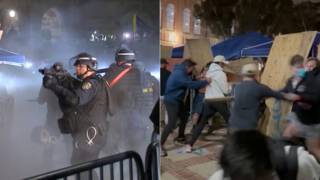
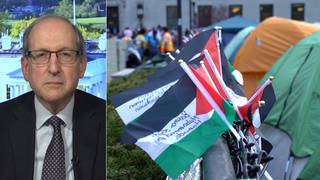
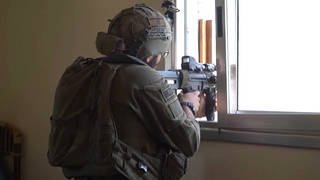
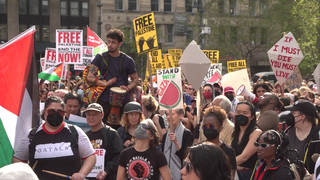






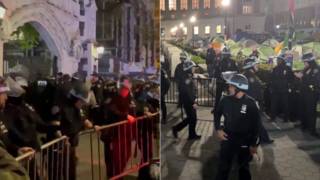
Media Options